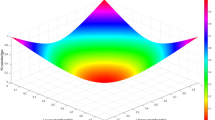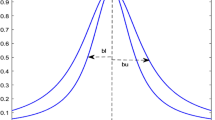Abstract
In this paper axiomatic characterizations of relation-based intuitionistic fuzzy rough approximation operators determined by an intuitionistic fuzzy triangular norm T and its dual intuitionistic fuzzy triangular conorm S on \([0, 1]\times [0, 1]\) are proposed. The constructive definitions and properties of S-lower and T-upper intuitionistic fuzzy rough approximation operators are first introduced. Operator-oriented characterizations of (S, T)-intuitionistic fuzzy rough approximation operators are then explored. Different sets of independent axioms for characterizing the essential properties of (S, T)-intuitionistic fuzzy rough approximation operators generated by various intuitionistic fuzzy relations are presented. Finally, it is examined that these sets of axioms can all be replaced by single axioms.
Similar content being viewed by others
References
Atanassov K (1999) Intuitionistic fuzzy sets: theory and applications. Physica-Verlag, Heidelberg
Bian XX, Wang P, Yu ZM, Bai XL, Chen B (2015) Characterizations of coverings for upper approximation operators being closure operators. Inf Sci 314:41–54
Cornelis C, Cock MD, Kerre EE (2003) Intuitionistic fuzzy rough sets: at the crossroads of imperfect knowledge. Expert Syst 20:260–270
Cornelis C, Deschrijver G, Kerre EE (2004) Implication in intuitionistic fuzzy and interval-valued fuzzy set theory: construction, classification, application. Int J Approx Reason 35:55–95
Deschrijver G, Cornelis C, Kerre EE (2004) On the representation of intuitionistic fuzzy \(t\)-norms and \(t\)-conorms. IEEE Trans Fuzzy Syst 12:45–61
Gong ZT, Zhang XX (2014) Variable precision intuitionistic fuzzy rough sets model and its application. Int J Mach Learn Cybern 5:263–280
Hooshmandasl MR, Karimi A, Almbardar M, Davvaz B (2013) Axiomatic systems for rough set-valued homomorphisms of associative rings. Int J Approx Reason 54:297–306
Huang B, Guo CX, Li HX, Feng GF, Zhou XZ (2016) Hierarchical structures and uncertainty measures for intuitionistic fuzzy approximation space. Inf Sci 336:92–114
Huang B, Guo CX, Zhuang YL, Li HX, Zhou XZ (2014) Intuitionistic fuzzy multigranulation rough sets. Inf Sci 277:299–320
Huang B, Zhuang YL, Li HY, Wei DK (2013) A dominance intuitionistic fuzzy-rough set approach and its applications. Appl Math Model 37:7128–7141
Liang DC, Liu D (2015) Deriving three-way decisions from intuitionistic fuzzy decision-theoretic rough sets. Inf Sci 300:28–48
Liu GL (2008) Axiomatic systems for rough sets and fuzzy rough sets. Int J Approx Reason 48:857–867
Liu GL (2013) Using one axiom to characterize rough set and fuzzy rough set approximations. Inf Sci 223:285–296
Liu XD, Pedrycz W, Chai TY, Song ML (2009) The development of fuzzy rough sets with the use of structures and algebras of axiomatic fuzzy sets. IEEE Trans Knowl Data Eng 21:443–462
Liu Y, Lin Y, Zhao HH (2015) Variable precision intuitionistic fuzzy rough set model and applications based on conflict distance. Expert Syst 32:220–227
Ma ZM, Li JJ, Mi JS (2015) Some minimal axiom sets of rough sets. Inf Sci 312:40–54
Mi JS, Leung Y, Zhao HY, Feng T (2008) Generalized fuzzy rough sets determined by a triangular norm. Inf Sci 178:3203–3213
Mi JS, Zhang WX (2004) An axiomatic characterization of a fuzzy generalization of rough sets. Inf Sci 160:235–249
Morsi NN, Yakout MM (1998) Axiomatics for fuzzy rough sets. Fuzzy Sets Syst 100:327–342
Pawlak Z (1991) Rough sets: theoretical aspects of reasoning about data. Kluwer Academic Publishers, Boston
Radzikowska AM, Kerre EE (2002) A comparative study of fuzzy rough sets. Fuzzy Sets Syst 126:137–155
She YH, Wang GJ (2009) An axiomatic approach of fuzzy rough sets based on residuated lattices. Comput Math Appl 58:189–201
Sun B, Ma W, Liu Q (2013) An approach to decision making based on intuitionistic fuzzy rough sets over two universes. J Oper Res Soc 64:1079–1089
Thiele H (2000) On axiomatic characterisation of crisp approximation operators. Inf Sci 129:221–226
Wang LD, Liu XD, Qiu WR (2012) Nearness approximation space based on axiomatic fuzzy sets. Int J Approx Reason 53:200–211
Wu WZ (2011) On some mathematical structures of \(T\)-fuzzy rough set algebras in infinite universes of discourse. Fundamenta Informaticae 108:337–369
Wu WZ, Gu SM, Li TJ, Xu YH (2014) Intuitionistic fuzzy rough approximation operators determined by intuitionistic fuzzy triangular norms. Lect Notes Artif Intell 8818:653–662
Wu WZ, Leung Y, Mi JS (2005) On characterizations of \(({\cal{I}}, {\cal{T}})\)-fuzzy rough approximation operators. Fuzzy Sets Syst 15:76–102
Wu WZ, Leung Y, Shao MW (2013) Generalized fuzzy rough approximation operators determined by fuzzy implicators. Int J Approx Reason 54:1388–1409
Wu WZ, Xu YH, Shao MW, Wang GY (2016) Axiomatic characterizations of \((S, T)\)-fuzzy rough approximation operators. Inf Sci 334–335:17–43
Wu WZ, Zhang WX (2004) Constructive and axiomatic approaches of fuzzy approximation operators. Inf Sci 159:233–254
Xu WH, Liu YF, Li TJ (2013) Intuitionistic fuzzy ordered information system. Int J Uncertain Fuzziness Knowl Based Syst 21:367–390
Yang B, Hu BQ (2016) A fuzzy covering-based rough set model and its generalization over fuzzy lattice. Inf Sci 367–368:463–486
Yang XP (2007) Minimization of axiom sets on fuzzy approximation operators. Inf Sci 177:3840–3854
Yang XP, Li TJ (2006) The minimization of axiom sets characterizing generalized approximation operators. Inf Sci 176:887–899
Yang XP, Yang Y (2013) Independence of axiom sets on intuitionistic fuzzy rough approximation operators. Int J Mach Learn Cybern 4:505–513
Yao YY (1998) Constructive and algebraic methods of the theory of rough sets. J Inf Sci 109:21–47
Yin YQ, Li HJ, Jun YB (2012) On algebraic structure of intuitionistic fuzzy soft sets. Comput Math Appl 64:2896–2911
Zhang HD, Xiong LL, Ma WY (2016) Generalized intuitionistic fuzzy soft rough set and its application in decision making. J Comput Anal Appl 20:750–766
Zhang YL, Li JJ, Wu WZ (2010) On axiomatic characterizations of three pairs of covering based approximation operators. Inf Sci 180:274–287
Zhang YL, Luo MK (2011) On minimization of axiom sets characterizing covering-based approximation operators. Inf Sci 181:3032–3042
Zhang XH, Zhou B, Li P (2012) A general frame for intuitionistic fuzzy rough sets. Inf Sci 216:34–49
Zhang ZM (2016) Attributes reduction based on intuitionistic fuzzy rough sets. J Intell Fuzzy Syst 30:1127–1137
Zhou NL, Hu BQ (2016) Axiomatic approaches to rough approximation operators on complete completely distributive lattices. Inf Sci 348:227–242
Zhou L, Wu WZ (2008) On generalized intuitionistic fuzzy approximation operators. Inf Sci 178:2448–2465
Zhou L, Wu WZ (2011) Characterization of rough set approximations in Atanassov intuitionistic fuzzy set theory. Comput Math Appl 62:282–296
Zhou L, Wu WZ, Zhang WX (2009) On characterization of intuitionistic fuzzy rough sets based on intuitionistic fuzzy implicators. Inf Sci 179:883–898
Zhu W, Wang FY (2003) Reduction and axiomization of covering generalized rough sets. Inf Sci 152:217–230
Acknowledgements
The authors would like to thank the anonymous referees and the Editor for their valuable comments and suggestions. This work was supported by grants from the National Natural Science Foundation of China (Nos. 41631179, 61573321, 61272021, 61673396, and 61363056) and the Open Foundation from Marine Sciences in the Most Important Subjects of Zhejiang (No. 20160102).
Author information
Authors and Affiliations
Corresponding author
Rights and permissions
About this article
Cite this article
Wu, WZ., Shao, MW. & Wang, X. Using single axioms to characterize (S, T)-intuitionistic fuzzy rough approximation operators. Int. J. Mach. Learn. & Cyber. 10, 27–42 (2019). https://doi.org/10.1007/s13042-017-0696-2
Received:
Accepted:
Published:
Issue Date:
DOI: https://doi.org/10.1007/s13042-017-0696-2




